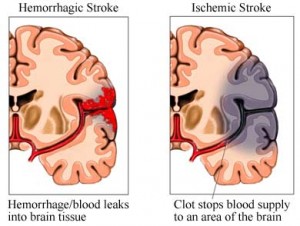In the Dec.9th issue of the Archives of Internal Medicine an important follow-up from the US Physicians’ Health Study was published. It examined the effect of obesity on the development of stroke later in life. 21,414 male physicians of the US have been followed now for 12.5 years in this study. At present there were 747 strokes (631 ischemic, 104 hemorrhagic, 12 others).
They found that the rates of strokes were in direct relation to the amount of excessive weight, in other words the higher the weight, the higher the risk to develop a stroke. It did not matter what kind of stroke it was (ischemic stroke or hemorrhagic stroke), a body mass index above 30 was always associated with a 1.9-fold risk to develop a stroke when compared to normal weight controls (body mass index less than 25). This risk of obesity was independent from other risk factors such as diabetes, high cholesterol or high blood pressure. Dr. Kurth from the Brigham and Women’s Hospital, Boston, said that this finding is very significant in view of the fact that many young adults in the US are either overweight or obese and they will be exposed to this risk for a longer period of time inreasing the risk to develop strokes even further. He hopes that physicians will concentrate on treating obesity more aggressively preventing a stroke. In industrial countries strokes are the main cause of disability and are on the third place on the list of causes of death.
(This info based on: Arch Intern Med 2002;162:2557-2562.)
Other information about strokes can be found through this link: http://www.nethealthbook.com/articles/cardiovasculardisease_strokeandcerebralaneurysm.php
Last edited December 10, 2012






